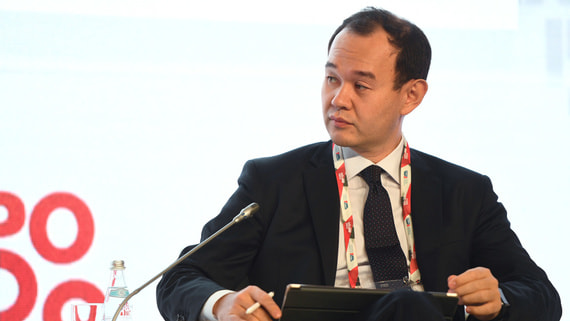The curator of the automotive industry in the Ministry of Industry and Trade Denis Pak left his post
[ad_1]

Director of the Department of Automotive Industry and Railway Engineering of the Ministry of Industry and Trade Denis Pak left his post. This was told to Vedomosti by a source close to the Ministry of Industry and Trade, and confirmed by Pak himself. A spokesman for the ministry declined to comment. On the website of the department in the section of the profile department, data on its leaders were deleted on September 21.
Pak took over as head of the department in 2017, replacing Alexey Volodin, who moved to Peugeot-Citroen. Prior to that, Pak headed the department for the development of domestic trade, light industry and the consumer market of the Ministry of Industry and Trade for five years, in 2011-2012. was an adviser to the Minister of Justice.
Who will replace Park as department director has not yet been announced. He has two deputies left – Tigran Parsadanyan and Grigory Tsyba, follows from the data on the website of the Ministry of Industry and Trade. Tigran Parsadanyan was announced as a speaker from the ministry at one of the specialized auto forums on September 22.
Talk about the departure of Pak has been going on for a long time, Vedomosti sources in national automakers say. One of them believes that the departure of the official will have a negative impact on the industry. Another interlocutor argues that Park has not recently “taken part in advocating for decisions that would benefit the auto industry.”
During Pak’s tenure, the auto industry has completely moved from industrial assembly to a new format of interaction between the state and business – special investment contracts (SPICs). This is a framework instrument that guarantees the company that the conditions for doing business in Russia will not worsen and tax benefits in exchange for obligations to localize production. It is also the main criterion for confirming that the products are manufactured in Russia. SPIC 1.0 were concluded until 2019 inclusive for 10 years. In the second version (SPIC 2.0), which were signed after 2019, the entry threshold for investments was canceled, the term of the agreement was extended to 15–20 years depending on the volume of investments, and a requirement for a competitive selection of participants appeared.
The auto industry signed the current SPICs en masse in 2018–2019. At that time, the industrial policy was supervised by Deputy Prime Minister Dmitry Kozak, who stood up for the uniform rules of the game for all enterprises in the automotive industry. Automakers entered into SPIC 1.0 for 10 years, expiring in 2028–2029. In June 2022, the heads of Russian national auto concerns, at a meeting with President Vladimir Putin, asked to extend existing investment contracts for a period of two to five years due to a violation of the current investment process caused by a Russian special operation in Ukraine.
Park’s departure was preceded by another castling among the officials of the Ministry of Industry and Trade, who oversee the auto industry. In May, Alexander Morozov, deputy head of the department, left his post, having held this position for seven years. He went to work atTransmashholding“. In his place was appointed head of the Ministry of Industry and Trade of the Republic of Tatarstan Albert Karimov.
Probably, someone from the team of the new deputy minister in Tatarstan, a manager from some auto concern, may be invited to the post of director of the department, which is under the jurisdiction of Karimov, Sergey Burgazliev, an independent consultant on the auto industry, believes. According to him, the current situation in the industry due to sanctions did not show the greatest effectiveness of the decisions made by the previous curators of the industry.
[ad_2]
Source link





